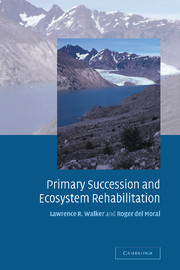Book contents
- Frontmatter
- Contents
- Preface and acknowledgements
- 1 Introduction
- 2 Denudation: the creation of a barren substrate
- 3 Successional theory
- 4 Soil development
- 5 Life histories of early colonists
- 6 Species interactions
- 7 Successional patterns
- 8 Applications of theory for rehabilitation
- 9 Future directions
- Glossary
- Illustration credits
- References
- Index
1 - Introduction
Published online by Cambridge University Press: 08 January 2010
- Frontmatter
- Contents
- Preface and acknowledgements
- 1 Introduction
- 2 Denudation: the creation of a barren substrate
- 3 Successional theory
- 4 Soil development
- 5 Life histories of early colonists
- 6 Species interactions
- 7 Successional patterns
- 8 Applications of theory for rehabilitation
- 9 Future directions
- Glossary
- Illustration credits
- References
- Index
Summary
Why learn about primary succession?
This book is for anyone interested in the consequences of disturbance. What happens after the lava cools, or when the muddy floodwaters recede or an old road is abandoned? Primary succession is the process of ecosystem development on barren surfaces where severe disturbances have removed most vestiges of biological activity. It includes the development of complex systems from simple biotic and abiotic (non-biological) components. Primary succession starts when plants, animals and microbes colonize new surfaces. The process is influenced by local conditions, context and site history. All new surfaces are initially devoid of life, so primary succession has been crucial throughout Earth's history. Today, all communities of plants, animals and soils are the result of primary succession. It is this process of recovery of ecosystems after disturbance that provides the clean air and water and fertile soils that humans and all organisms need to survive.
Ecosystem development on initially barren surfaces has always been of great importance to humans. Hunters depended on game that migrated into the fertile terrain exposed by retreating glaciers. With the transition to agriculture, communities became dependent on the periodic deposition of nutrients by floodwaters along such rivers as the Euphrates and Nile to sustain soil fertility and civilization. Away from floodplains, farmers have had to manipulate succession to produce crops on infertile sites. Present-day ecologists use lessons from primary succession in many ways (e.g. to create new habitats and to rehabilitate mined lands and pastures).
- Type
- Chapter
- Information
- Primary Succession and Ecosystem Rehabilitation , pp. 1 - 13Publisher: Cambridge University PressPrint publication year: 2003

